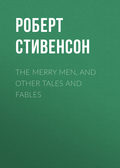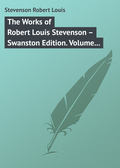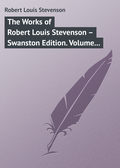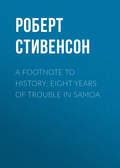
Роберт Льюис Стивенсон
The Works of Robert Louis Stevenson – Swanston Edition. Volume 23
To Sidney Colvin
I had written to him of the proposal that I should do the volume on Keats for Macmillan’s English Men of Letters series. From his essay, Talk and Talkers, I was eventually left out.
[Chalet am Stein, Davos-Platz, Spring 1882.]
DEAR COLVIN, – About Keats – well yes, I wonder; I see all your difficulties and yet, I have the strongest kind of feeling that critical biography is your real vein. The Landor was one nail; another, I think, would be good for you and the public. Indeed I would do the Keats. He is worth doing; it is a brave and a sad little story, and the critical part lies deep in the very vitals of art. All summed, I would do him; remember it is but a small order alongside of Landor; and £100, and kudos, and a good word for the poor, great lad, who will otherwise fall among the molluscs. Up, heart! give me a John Keats! Houghton, though he has done it with grace, has scarce done it with grip.
I have put you into Talk and Talkers sure enough. God knows, I hope I shall offend nobody; I do begin to quake mightily over that paper. I have a Gossip on Romance about done; it puts some real criticism in a light way, I think. It is destined for Longman who (dead secret) is bringing out a new Mag. (6d.) in the Autumn. Dead Secret: all his letters are three deep with masks and passwords, and I swear on a skull daily. F. has reread Treasure Id., against which she protested; and now she thinks the end about as good as the beginning; only some six chapters situate about the midst of the tale to be rewritten. This sounds hopefuller. My new long story, The Adventures of John Delafield, is largely planned.
R. L. S.
To Edmund Gosse
Stevenson and Mr. Gosse were still meditating a book in which some of the famous historical murder cases should be retold (see above, p. 338). “Gray” and “Keats” are volumes in the English Men of Letters series.
[Chalet am Stein, Davos, March 23, 1882.]
MY DEAR WEG, – And I had just written the best note to Mrs. Gosse that was in my power. Most blameable.
I now send (for Mrs. Gosse)
BLACK CANYON
Also an advertisement of my new appearance as poet (bard, rather) and hartis on wood. The cut represents the Hero and the Eagle, and is emblematic of Cortez first viewing the Pacific Ocean, which (according to the bard Keats) it took place in Darien. The cut is much admired for the sentiment of discovery, the manly proportions of the voyager, and the fine impression of tropical scenes and the untrodden WASTE, so aptly rendered by the hartis.
I would send you the book; but I declare I’m ruined. I got a penny a cut and a halfpenny a set of verses from the flint-hearted publisher, and only one specimen copy, as I’m a sinner. – was apostolic alongside of Osbourne.
I hope you will be able to decipher this, written at steam speed with a breaking pen, the hotfast postman at my heels. No excuse, says you. None, sir, says I, and touches my ’at most civil (extraordinary evolution of pen, now quite doomed – to resume – ) I have not put pen to the Bloody Murder yet. But it is early on my list; and when once I get to it, three weeks should see the last bloodstain – maybe a fortnight. For I am beginning to combine an extraordinary laborious slowness while at work, with the most surprisingly quick results in the way of finished manuscripts. How goes Gray? Colvin is to do Keats. My wife is still not well. – Yours ever,
R. L. S.
To Dr. Alexander Japp
“The enclosed” means a packet of the Davos Press cuts.
[Chalet am Stein, Davos, March 1882.]
MY DEAR DR. JAPP, – You must think me a forgetful rogue, as indeed I am; for I have but now told my publisher to send you a copy of the Familiar Studies. However, I own I have delayed this letter till I could send you the enclosed. Remembering the nights at Braemar when we visited the Picture Gallery, I hoped they might amuse you. You see, we do some publishing hereaway. I shall hope to see you in town in May. – Always yours faithfully,
Robert Louis Stevenson.
To Dr. Alexander Japp
The references in the first paragraph are to the volume Familiar Studies of Men and Books.
Chalet am Stein, Davos, April 1, 1882.
MY DEAR DR. JAPP, – A good day to date this letter, which is in fact a confession of incapacity. During my wife’s illness I somewhat lost my head, and entirely lost a great quire of corrected proofs. This is one of the results; I hope there are none more serious. I was never so sick of any volume as I was of that; I was continually receiving fresh proofs with fresh infinitesimal difficulties. I was ill – I did really fear my wife was worse than ill. Well, it’s out now; and though I have observed several carelessnesses myself, and now here’s another of your finding – of which, indeed, I ought to be ashamed – it will only justify the sweeping humility of the Preface.
Symonds was actually dining with us when your letter came, and I communicated your remarks… He is a far better and more interesting thing than any of his books.
The Elephant was my wife’s; so she is proportionately elate you should have picked it out for praise – from a collection, let me add, so replete with the highest qualities of art.
My wicked carcase, as John Knox calls it, holds together wonderfully. In addition to many other things, and a volume of travel, I find I have written, since December, 9 °Cornhill pages of magazine work – essays and stories: 40,000 words, and I am none the worse – I am the better. I begin to hope I may, if not outlive this wolverine upon my shoulders, at least carry him bravely like Symonds and Alexander Pope. I begin to take a pride in that hope.
I shall be much interested to see your criticisms; you might perhaps send them to me. I believe you know that is not dangerous; one folly I have not – I am not touchy under criticism.
Lloyd and my wife both beg to be remembered; and Lloyd sends as a present a work of his own. I hope you feel flattered; for this is simply the first time he has ever given one away. I have to buy my own works, I can tell you. – Yours very sincerely,
Robert Louis Stevenson.
To W. E. Henley
From about this time until 1885 Mr. Henley acted in an informal way as agent for R. L. S. in most of his dealings with publishers in London. “Both” in the second paragraph means, I think, Treasure Island and Silverado Squatters.
[Chalet am Stein, Davos, April 1882.]
MY DEAR HENLEY, – I hope and hope for a long letter – soon I hope to be superseded by long talks – and it comes not. I remember I have never formally thanked you for that hundred quid, nor in general for the introduction to Chatto and Windus, and continue to bury you in copy as if you were my private secretary. Well, I am not unconscious of it all; but I think least said is often best, generally best; gratitude is a tedious sentiment, it’s not ductile, not dramatic.
If Chatto should take both, cui dedicare? I am running out of dedikees; if I do, the whole fun of writing is stranded. Treasure Island, if it comes out, and I mean it shall, of course goes to Lloyd. Lemme see, I have now dedicated to
W. E. H. [William Ernest Henley].
S. C. [Sidney Colvin].
T. S. [Thomas Stevenson].
Simp. [Sir Walter Simpson].
There remain: C. B., the Williamses – you know they were the parties who stuck up for us about our marriage, and Mrs. W. was my guardian angel, and our Best Man and Bridesmaid rolled in one, and the only third of the wedding party – my sister-in-law, who is booked for Prince Otto– Jenkin I suppose some time – George Meredith, the only man of genius of my acquaintance, and then I believe I’ll have to take to the dead, the immortal memory business.
Talking of Meredith, I have just re-read for the third and fourth time The Egoist. When I shall have read it the sixth or seventh, I begin to see I shall know about it. You will be astonished when you come to re-read it; I had no idea of the matter – human, red matter he has contrived to plug and pack into that strange and admirable book. Willoughby is, of course, a pure discovery; a complete set of nerves, not heretofore examined, and yet running all over the human body – a suit of nerves. Clara is the best girl ever I saw anywhere. Vernon is almost as good. The manner and the faults of the book greatly justify themselves on further study. Only Dr. Middleton does not hang together; and Ladies Busshe and Culmer sont des monstruosités. Vernon’s conduct makes a wonderful odd contrast with Daniel Deronda’s. I see more and more that Meredith is built for immortality.
Talking of which, Heywood, as a small immortal, an immortalet, claims some attention. The Woman killed with Kindness is one of the most striking novels – not plays, though it’s more of a play than anything else of his – I ever read. He had such a sweet, sound soul, the old boy. The death of the two pirates in Fortune by Sea and Land is a document. He had obviously been present, and heard Purser and Clinton take death by the beard with similar braggadocios. Purser and Clinton, names of pirates; Scarlet and Bobbington, names of highwaymen. He had the touch of names, I think. No man I ever knew had such a sense, such a tact, for English nomenclature: Rainsforth, Lacy, Audley, Forrest, Acton, Spencer, Frankford – so his names run.
Byron not only wrote Don Juan; he called Joan of Arc “a fanatical strumpet.” These are his words. I think the double shame, first to a great poet, second to an English noble, passes words.
Here is a strange gossip. – I am yours loquaciously,
R. L. S.
My lungs are said to be in a splendid state. A cruel examination, an exanimation I may call it, had this brave result. Taïaut! Hillo! Hey! Stand by! Avast! Hurrah!
To Mrs. T. Stevenson
[Chalet am Stein, Davos, April 9, 1882.]
MY DEAR MOTHER, – Herewith please find belated birthday present. Fanny has another.

My dear mother, how can I keep up with your breathless changes? Innerleithen, Cramond, Bridge of Allan, Dunblane, Selkirk. I lean to Cramond, but I shall be pleased anywhere, any respite from Davos; never mind, it has been a good, though a dear lesson. Now, with my improved health, if I can pass the summer, I believe I shall be able no more to exceed, no more to draw on you. It is time I sufficed for myself indeed. And I believe I can.
I am still far from satisfied about Fanny; she is certainly better, but it is by fits a good deal, and the symptoms continue, which should not be. I had her persuaded to leave without me this very day (Saturday 8th), but the disclosure of my mismanagement broke up that plan; she would not leave me lest I should mismanage more. I think this an unfair revenge; but I have been so bothered that I cannot struggle. All Davos has been drinking our wine. During the month of March, three litres a day were drunk – O it is too sickening – and that is only a specimen. It is enough to make any one a misanthrope, but the right thing is to hate the donkey that was duped – which I devoutly do.
I have this winter finished Treasure Island, written the preface to the Studies, a small book about the Inland Voyage size, The Silverado Squatters, and over and above that upwards of ninety (90) Cornhill pages of magazine work. No man can say I have been idle. – Your affectionate son,
R. L. Stevenson.
To R. A. M. Stevenson
[Chalet am Stein, Davos-Platz, April 1882.]
MY DEAR BOB, – Yours received. I have received a communication by same mail from my mother, clamouring for news, which I must answer as soon as I’ve done this. Of course, I shall paint your game in lively colours.
I hope to get away from here – let me not speak of it ungratefully – from here – by Thursday at latest. I am indeed much better; but a slip of the foot may still cast me back. I must walk circumspectly yet awhile. But O to be able to go out and get wet, and not spit blood next day!
Yes, I remember the enfantement of the Arabian Nights; the first idea of all was the handsome cabs, which I communicated to you in St. Leonard’s Terrace drawing-room. That same afternoon the Prince de Galles and the Suicide Club were invented; and several more now forgotten. I must try to start ’em again.
Lloyd I believe is to be a printer – in the meantime he confines himself to being an expense. He is a first-rate lad for all that. He is now interrupting me about twice to the line, which does not condooce to clarity, I’m afraid.
Fanny is still far from well, quite far from well. My faith is in the Pirate.
I enclose all my artistic works; they are woodcuts – I cut them with a knife out of blocks of wood: I am a wood-engraver; I aaaam a wooooood engraaaaver. Lloyd then prints ’em: are they not fun? I doat on them; in my next venture, I am going to have colour printing; it will be very laborious, six blocks to cut for each picter, but the result would be pyramidal.
If I get through the summer, I settle in Autumn in le pays de France; I believe in the Brittany and become a Snoozer. You will come and snooze awhile won’t you, and try and get Louisa to join.
Pepys was a decent fellow; singularly like Charles Baxter, by the way, in every character of mind and taste, and not unlike him in face. I did not mean I had been too just to him but not just enough to bigger swells. I would rather have known Pepys than the whole jing-bang; I doat on him as a card to know.
We shall be pretty poor at the start, of course, but I guess we can haul through. Only intending visitors to the Brittannic Castle must not look for nightingales’ tongues. When next you see the form of the jeune et beau pray give him my love, when I come to Weybridge, I’ll hope to see him. – Ever yours affectionately,
R. L. Stevenson, 1er Roi de Béotie.Pour copie conforme,Le sécrétaire Royale, W. P. Bannatyne.
To Trevor Haddon
The few remaining letters of this period are dated from Edinburgh and from Stobo Manse, near Peebles. This, in the matter of weather and health, was the most disappointing of all Stevenson’s attempts at summer residence in Scotland. Before going to Stobo he made a short excursion with his father to Lochearnhead; and later spent some three weeks with me at Kingussie, but from neither place wrote any letters worth preserving. The following was addressed to a young art-student who had read the works of Walt Whitman after reading Stevenson’s essay on him, and being staggered by some things he found there had written asking for further comment and counsel.
17 Heriot Row, Edinburgh [June 1882].
DEAR SIR, – If I have in any way disquieted you, I believe you are justified in bidding me stand and deliver a remedy if there be one: which is the point.
1st I am of your way of thinking: that a good deal of Whitman is as well taken once but 2nd I quite believe that it is better to have everything brought before one in books. In that way the problems reach us when we are cool, and not warped by the sophistries of an instant passion. Life itself presents its problems with a terrible directness and at the very hour when we are least able to judge calmly. Hence this Pisgah sight of all things, off the top of a book, is only a rational preparation for the ugly grips that must follow.
But 3rd, no man can settle another’s life for him. It is the test of the nature and courage of each that he shall decide it for himself. Each in turn must meet and beard the Sphynx. Some things however I must say – and you will treat them as things read in a book for you to accept or refuse as you shall see most fit.
Go not out of your way to make difficulties. Hang back from life while you are young. Shoulder no responsibilities. You do not yet know how far you can trust yourself – it will not be very far, or you are more fortunate than I am. If you can keep your sexual desires in order, be glad, be very glad. Some day, when you meet your fate, you will be free, and the better man. Don’t make a boy and girl friendship that which it is not. Look at Burns: that is where amourettes conduct an average good man; and a tepid marriage is only a more selfish amourette – in the long run. Whatever you do, see that you don’t sacrifice a woman; that’s where all imperfect loves conduct us. At the same time, if you can make it convenient to be chaste, for God’s sake, avoid the primness of your virtue; hardness to a poor harlot is a sin lower than the ugliest unchastity.
Never be in a hurry anyhow.
There is my sermon.
Certainly, you cannot too earnestly go in for the Greek; and about any art, think last of what pays, first of what pleases. It is in that spirit only that an art can be made. Progress in art is made by learning to enjoy it. That which seems a little dull at first, is found to contain the elements of pleasure more largely though more quietly commingled.
I return to my sermon for one more word: Natural desire gives you no right to any particular woman: that comes with love only, and don’t be too ready to believe in love: there are many shams: the true love will not allow you to reason about it.
It is your fault if I appear so pulpiteering.
Wishing you well in life and art, and that you may long be young. – Believe me, yours truly,
Robert Louis Stevenson.
To Edmund Gosse
[Edinburgh] Sunday [June 1882].
… Note turned up, but no gray opuscule, which, however, will probably turn up to-morrow in time to go out with me to Stobo Manse, Peeblesshire, where, if you can make it out, you will be a good soul to pay a visit. I shall write again about the opuscule; and about Stobo, which I have not seen since I was thirteen, though my memory speaks delightfully of it.
I have been very tired and seedy, or I should have written before, inter alia, to tell you that I had visited my murder place and found living traditions not yet in any printed book; most startling. I also got photographs taken, but the negatives have not yet turned up. I lie on the sofa to write this, whence the pencil; having slept yesterday – 1 + 4 + 7½ = 12½ hours and being (9 a. m.) very anxious to sleep again. The arms of Porpus, quoi! A poppy gules, etc.
From Stobo you can conquer Peebles and Selkirk, or to give them their old decent names, Tweeddale and Ettrick. Think of having been called Tweeddale, and being called Peebles! Did I ever tell you my skit on my own travel books? We understand that Mr. Stevenson has in the press another volume of unconventional travels: Personal Adventures in Peeblesshire. Je la trouve méchante. – Yours affectionately,
R. L. S.
Did I say I had seen a verse on two of the Buccaneers? I did, and ça-y-est.
To Trevor Haddon
17 Heriot Row, Edinburgh [June 1882].
MY DEAR SIR, – I see nothing “cheekie” in anything you have done. Your letters have naturally given me much pleasure, for it seems to me you are a pretty good young fellow, as young fellows go; and if I add that you remind me of myself, you need not accuse me of retrospective vanity.
You now know an address which will always find me; you might let me have your address in London; I do not promise anything – for I am always overworked in London – but I shall, if I can arrange it, try to see you.
I am afraid I am not so rigid on chastity: you are probably right in your view; but this seems to me a dilemma with two horns, the real curse of a man’s life in our state of society – and a woman’s too, although, for many reasons, it appears somewhat differently with the enslaved sex. By your “fate” I believe I meant your marriage, or that love at least which may befall any one of us at the shortest notice and overthrow the most settled habits and opinions. I call that your fate, because then, if not before, you can no longer hang back, but must stride out into life and act. – Believe me, yours sincerely,
Robert Louis Stevenson.
To Edmund Gosse
Mr. Gosse had mistaken the name of the Peeblesshire manse, and is reproached accordingly. “Gray” is Mr. Gosse’s volume on that poet in Mr. Morley’s series of English Men of Letters.
Stobo Manse, Peeblesshire [July 1882].
I would shoot you, but I have no bow:
The place is not called Stobs, but Stobo.
As Gallic Kids complain of “Bobo,”
I mourn for your mistake of Stobo.
First, we shall be gone in September. But if you think of coming in August, my mother will hunt for you with pleasure. We should all be overjoyed – though Stobo it could not be, as it is but a kirk and manse, but possibly somewhere within reach. Let us know.
Second, I have read your Gray with care. A more difficult subject I can scarce fancy; it is crushing; yet I think you have managed to shadow forth a man, and a good man too; and honestly, I doubt if I could have done the same. This may seem egoistic; but you are not such a fool as to think so. It is the natural expression of real praise. The book as a whole is readable; your subject peeps every here and there out of the crannies like a shy violet – he could do no more – and his aroma hangs there.
I write to catch a minion of the post. Hence brevity. Answer about the house. – Yours affectionately,
R. L. S.







